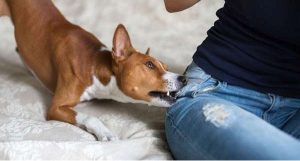Decoding Puppy Behavior: Why Does My Puppy keep Biting me?
Puppies are often perceived as adorable and gentle creatures, providing companionship and joy to their owners. However, the reality is that they also possess an innate tendency to bite, which can be a cause of concern for many pet owners.
This behavior might seem overwhelming at times, leading individuals to question why their puppies persistently engage in biting behaviors towards them. In order to address this issue effectively, it is crucial to delve into the nature of puppy biting and understand its underlying causes.

By exploring various factors such as teething, playfulness, and socialization deficiencies, one can gain insights into the motivations behind this behavior. Additionally, implementing appropriate strategies involving chew toys, bite inhibition training, and consistent boundaries can help redirect a puppy’s biting tendencies towards more suitable outlets.
Seeking professional assistance may also prove beneficial when confronted with particularly persistent or severe cases of puppy biting. Ultimately, through understanding the reasons behind this behavior and employing effective techniques for management and redirection, pet owners can develop a harmonious relationship with their furry companions while ensuring safety and well-being for all parties involved.
Key Takeaways
- Using treats or praise, redirecting focus onto toys or activities, providing mental stimulation, and reinforcing calm behavior with rewards are effective strategies to encourage desired behavior and discourage biting in puppies.
- Creating a calm environment and implementing strategies to foster a calm atmosphere can help reduce biting tendencies in puppies.
- Seeking professional help from a veterinarian or dog trainer is essential for persistent biting or aggression issues in puppies. They can rule out underlying medical conditions, recommend positive reinforcement strategies, and offer tailored solutions for biting tendencies.
- Additional resources and support, such as puppy training classes led by experienced trainers and online forums where dog owners can share experiences and gain advice, can be valuable in addressing and managing puppy biting behaviors.
Understand the Nature of Puppy Biting
The behavior of puppy biting can be better understood by examining the natural instincts and developmental stages of puppies. Understanding puppy behavior is crucial in addressing this issue effectively.
Puppies explore their surroundings through mouthing and biting, as it is a normal part of their development. They use their mouths to investigate objects, play, and establish social bonds with littermates.

Additionally, during teething, puppies may bite more frequently as a way to alleviate discomfort. However, it is important to redirect biting behavior towards appropriate outlets such as chew toys or interactive play sessions. This helps them learn bite inhibition and understand what is acceptable behavior when interacting with humans.
By understanding the underlying reasons for puppy biting and providing appropriate alternatives, pet owners can effectively manage this behavior and prevent it from becoming a long-term habit.
Provide Appropriate Chew Toys and Diversions
To address the issue of excessive biting, it is essential to offer appropriate chew toys and diversions that can redirect your puppy’s attention. Providing your puppy with suitable chew toys can help satisfy their natural instinct to chew and alleviate any discomfort they may be experiencing during teething.
Here are five effective techniques that can divert your puppy’s attention away from biting:
- Offer a variety of chew toys made specifically for puppies.
- Use interactive puzzle toys that require mental stimulation.
- Provide frozen treats or ice cubes to soothe sore gums.
- Engage in active play sessions using tug toys or balls.
- Teach your puppy basic commands like ‘sit’ or ‘stay’ as a way to redirect their focus.
By offering a range of appropriate chew toys and utilizing diversion techniques, you can redirect your puppy’s biting behavior towards more acceptable outlets while promoting their overall well-being.
Teach Bite Inhibition
Teaching bite inhibition is a crucial aspect of puppy training, as it allows them to develop self-control and understand the appropriate level of force to use during play. This skill is important for their socialization with humans and other animals, as biting can cause harm or discomfort. By teaching bite inhibition, puppies learn to inhibit the force of their bites, making interactions safer and more enjoyable for everyone involved.

One effective way to teach bite inhibition is through controlled puppy play sessions. During these sessions, owners should monitor their puppy’s behavior closely and intervene if the biting becomes too intense. When a puppy bites too hard, owners can yelp loudly or make a high-pitched sound to startle them. This mimics how puppies would react when bitten by their littermates and helps them understand that biting too hard leads to an unpleasant consequence.
Additionally, providing appropriate chew toys and diversions can redirect a puppy’s urge to bite onto more acceptable objects. This helps satisfy their natural chewing instinct while also preventing destructive chewing behaviors directed towards furniture or personal belongings.
Incorporating positive reinforcement techniques such as praise and treats when a puppy exhibits gentle play behavior also reinforces the desired outcome of bite inhibition. Consistency and patience are key in this training process.
The table below summarizes some key points on teaching bite inhibition:
| Teaching Bite Inhibition |
|---|
| – Crucial aspect of puppy training |
| – Develops self-control |
| – Understand appropriate level of force during play |
| – Important for socialization with humans and animals |
| – Reduces risk of harm or discomfort |
By emphasizing the importance of teaching bite inhibition during puppy training, pet owners can help foster well-behaved dogs that interact safely with others.
Establish Boundaries and Consistent Training
This discussion will focus on the importance of establishing clear rules and expectations when training a puppy.
Setting boundaries helps the puppy understand what behaviors are acceptable and unacceptable, promoting a harmonious relationship between the puppy and its owner.
Additionally, reward-based training methods can be highly effective in teaching puppies desired behaviors by reinforcing positive actions with treats or praise.
It is also crucial to avoid engaging in rough play with the puppy as this can encourage biting and aggressive behavior.
Encouraging calm behavior from an early age sets a foundation for good manners and self-control in the puppy’s future interactions.
Set Clear Rules and Expectations
Establishing clear rules and expectations can serve as the compass guiding a puppy’s behavior, leading to a harmonious relationship free from incessant biting. Setting boundaries is crucial in teaching puppies what is acceptable and what is not. By clearly defining limits, such as not allowing the puppy to mouth or bite during playtime, owners can communicate their expectations effectively.
Additionally, positive reinforcement plays a vital role in shaping a puppy’s behavior. Rewarding good behavior with treats or praise reinforces the desired actions and encourages puppies to repeat them. This method of training helps puppies understand that biting is undesirable while promoting alternative behaviors like chewing on appropriate toys instead.
Consistency in enforcing these rules ensures that puppies learn quickly and develop self-control over time, resulting in a well-behaved companion.
Reward-Based Training Methods
Transitioning from setting clear rules and expectations, one effective way to address the issue of biting puppies is through reward-based training techniques. These methods involve using positive reinforcement to encourage desired behaviors and discourage unwanted ones. By rewarding good behavior with treats, praise, or playtime, puppies learn that certain actions result in positive outcomes. This approach not only helps in teaching them appropriate behavior but also strengthens the bond between the owner and the puppy.
To implement reward-based training successfully, consider the following:
- Consistency: Be consistent in providing rewards for desired behaviors to reinforce their importance.
- Timing: Offer rewards immediately after the desired behavior is exhibited to make a clear association.
- Gradual progression: Start with simple commands and gradually increase difficulty for continued learning.
- Patience and persistence: Training takes time; it’s essential to remain patient and persistent throughout the process.
By employing these positive reinforcement methods, owners can effectively train their puppies while promoting a loving and respectful relationship with them.
Avoid Rough Play and Encourage Calm Behavior
To promote a safe and harmonious environment, it is important to discourage rough play and encourage calm behavior in puppies. Calm behavior techniques can help manage puppy energy and prevent unwanted biting behaviors. One effective technique is redirecting the puppy’s focus onto appropriate toys or activities when they start to exhibit signs of overexcitement or aggression. Providing mental stimulation through puzzle toys or obedience training can also help channel their energy in a positive way. Additionally, creating a calm environment by keeping noise levels low and avoiding chaotic situations can help reduce the likelihood of rough play. It is crucial to consistently reinforce calm behavior with rewards such as treats or praise to encourage the desired response. By implementing these strategies, owners can foster an atmosphere of tranquility while teaching their puppies appropriate ways to interact with humans and other animals.
| Techniques for Encouraging Calm Behavior | Techniques for Managing Puppy Energy |
|---|---|
| Redirect focus onto toys or activities | Provide mental stimulation |
| Reinforce calm behavior with rewards | Create a calm environment |
Seek Professional Help if Necessary
Consulting a veterinarian or dog trainer can be beneficial when dealing with a puppy that consistently bites. These professionals have the knowledge and experience to assess the situation and provide appropriate guidance on how to address aggression or persistent biting.
Additionally, they can offer additional resources and support for puppy owners struggling with this issue.
Consult a Veterinarian or Dog Trainer
Engaging the expertise of a veterinarian or dog trainer can be likened to unlocking a treasure trove of knowledge, offering invaluable insights into understanding why your puppy persistently bites.
These professionals specialize in behavioral modification techniques and can provide guidance on how to address this issue effectively.
A veterinarian is well-versed in animal behavior and can rule out any underlying medical conditions that may contribute to the biting behavior. Moreover, they can suggest appropriate training methods and recommend positive reinforcement strategies to discourage biting.
On the other hand, a dog trainer possesses extensive experience in dealing with canine behavior problems and can offer tailored solutions for your puppy’s biting tendencies. Their expertise lies in teaching puppies alternative behaviors through reward-based training methods, reinforcing desirable actions while discouraging undesirable ones like biting.
Seeking professional help ensures that you receive evidence-based advice and assistance in managing your puppy’s biting behavior effectively.
Addressing Aggression or Persistent Biting
Addressing aggression or persistent biting requires implementing consistent training techniques and reinforcing positive behaviors to discourage aggressive tendencies.
When dealing with a puppy that exhibits aggression or persistent biting, it is important to seek professional help from a veterinarian or dog trainer. These professionals can provide guidance on how to address the issue effectively and safely.

One approach is to use positive reinforcement training methods, which involve rewarding good behavior while ignoring or redirecting unwanted behaviors. This helps the puppy understand what is expected of them and encourages them to adopt more appropriate ways of interacting with humans.
Additionally, it may be necessary to establish boundaries and rules within the household to prevent situations that trigger aggressive behavior.
Seeking professional help ensures that the puppy’s needs are properly addressed and helps prevent any potential harm caused by their biting tendencies.
Additional Resources and Support for Puppy Owners
Accessing additional resources and support can be beneficial for puppy owners who are seeking guidance on managing their dog’s behavior.
Puppy training classes provide a structured environment where puppies can learn basic obedience commands and appropriate socialization skills. These classes are usually led by experienced trainers who can offer valuable advice and techniques to address biting behaviors.
Online forums also serve as a helpful resource, allowing puppy owners to connect with other dog owners who may have faced similar challenges. These forums provide a platform for sharing experiences, asking questions, and receiving advice from knowledgeable individuals.
By utilizing these additional resources and support systems, puppy owners can gain valuable insights and strategies to effectively manage their dog’s biting behavior in a positive manner.
See also:
How to Stop Puppies from Biting and Chewing
Puppy Teething: A Complete Guide
Frequently Asked Questions
How can I stop my puppy from biting me when I play with him?
To stop a puppy from biting during play, it is important to employ effective techniques such as redirecting the behavior. This can be achieved by offering alternative toys or treats, and providing consistent training and positive reinforcement methods.
What should I do if my puppy bites me too hard?
To address excessive puppy biting, effective methods to prevent this behavior and promote a respectful relationship include redirecting the puppy’s attention towards appropriate toys or activities, using positive reinforcement techniques, and seeking professional guidance if needed.
Will giving my puppy more attention help reduce biting?
Socializing with other puppies can reduce biting behavior in some cases. Teaching alternative behaviors, such as offering a toy instead of biting, can also help reduce biting. Both approaches promote positive interactions and discourage unwanted behavior.
Are there any specific chew toys that are good for teething puppies?
Some of the best chew toys for teething puppies include Kong Classic, Nylabone Puppy Chew, and Benebone Wishbone. Alternatives to chew toys include frozen washcloths or carrots. These options can help alleviate teething discomfort and discourage inappropriate biting behaviors.
Can I train my puppy to stop biting on my own, or do I need professional help?
Consistent training is crucial in stopping puppy biting behavior. Seeking professional help can provide benefits such as expertise, personalized guidance, and faster results. Professional trainers have the knowledge and experience to address specific issues effectively, ensuring a well-behaved and happy puppy.
